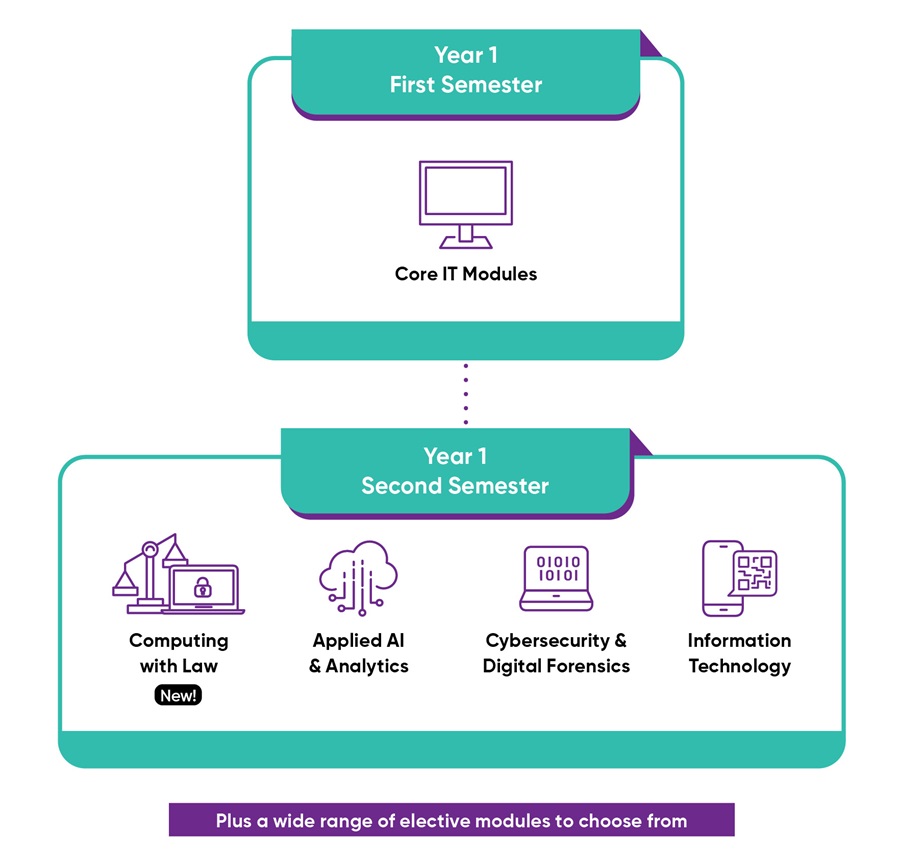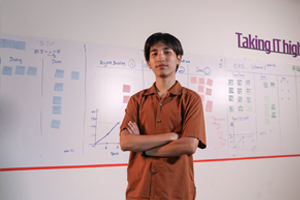Why CICTP?
- Gateway to one of four popular ICT diplomas:
- Computing with Law New!
- Applied AI & Analytics
- Cybersecurity & Digital Forensics
- Information Technology
- Customise your learning with a wide variety of electives offered in all ICT courses
- Through foundational learning and exposure to industry trends, our career & professional preparation modules will help you choose your career path
About CICTP
Fascinated by infocomm technology (ICT), but still undecided about which course to pursue? The Common ICT Programme (CICTP) lets you explore different disciplines before selecting your learning pathway.
In your first semester, you will learn broad-based fundamentals such as programming and computing mathematics, along with discipline-specific skills in legal and compliance technologies, cybersecurity, and data science. The course provides insights into various roles and career paths, helping you discover your interests and aptitude.
At the end of your semester, you can choose your preferred discipline:
- Computing with Law New!
- Applied AI & Analytics
- Cybersecurity & Digital Forensics
- Information Technology
Overview of Your CICTP Journey

Impactful Learning Experience
Entry Requirements
AGGREGATE TYPE ELR2B2-C
To be eligible for consideration, candidates must have the following GCE ‘O’ Level examination (or equivalent) results.
| Subject | 'O' Level Grade |
|---|---|
| English Language | 1-7 |
| Additional Mathematics/Mathematics | 1-6 |
| Any one of the 2nd group of Relevant Subjects for the ELR2B2-C Aggregate Type | 1-6 |
Applicants must also fulfil the aggregate computation requirements for the ELR2B2-C Aggregate Type ( English Language, 2 relevant subjects and 2 other best subjects) listed at www.np.edu.sg/docs/ELR2B2.pdf.
For students with other qualifications, please refer to the NP website for the entry requirements and admissions exercise period.
Candidates with severe vision deficiency may encounter difficulties meeting the course requirements and expectations.
What You Will Learn
LEAD: Computing in Practice (4 Credit Units)
This module provides a foundational understanding of how Legal Technology, Software Engineering, Data Analytics and Cybersecurity interrelate and contribute to digital transformation across industry. It aims to strengthen students’ appreciation of the ethical, legal and professional dimensions of technology and its role in shaping responsible innovation. Students will engage in thematic clusters that explore topics such as data analytics, cybersecurity awareness, digital governance and emerging technologies. Each cluster incorporates experiential learning through applied projects, industry talks and site visits that promote a practical understanding of computing in context. By the end of the module, students will have developed a holistic understanding of the ICT landscape and its applications in real-world practice.
AI & Ethics (2 Credit Units)
This module introduces students to the foundational concepts of Artificial Intelligence (AI) and the ethical challenges that arise in its design, development, and deployment. Students will explore how AI technologies impact individuals, organizations, and society at large.
Through a blend of theoretical frameworks and practical case studies, students will critically examine key ethical principles including fairness, accountability, transparency, privacy, and human well-being. The module emphasizes the importance of ethical reasoning and responsible innovation in ICT, preparing students to navigate complex moral dilemmas in real-world AI application development.
Programming Fundamentals (5 Credit Units)
This module introduces the fundamentals of programming and how to develop programs using appropriate problem-solving techniques in a modular style. In this practice-oriented module, students are taught how to apply problem-solving skills using a top-down structured programming methodology and given ample practice in translating solutions into computer programs, followed by testing and debugging of the programs. Topics include data types, variables, expressions, statements, selection structures, loops, simple computation and algorithms, functions and the use of libraries.
Students will also practise the use of pseudocode and flowcharts, leveraging Gen AI productivity tools, best practices of programming, debugging techniques, development of test cases, and suitable program documentation. In addition, they will study various areas where application software plays a prominent part in helping organisations to solve problems. Students will be given ample opportunity for independent and self-directed learning.
Computing Mathematics (4 Credit Units)
This module introduces the basic concepts of relations and functions, matrices, statistical methods and relevant applications. The main emphasis is to develop students’ ability in solving quantitative problems in computing mathematics, probability and statistics.
English Language Express*
English Language Express aims to give you a better grounding in the English Language and to strengthen the written and oral communications skills that you will need in your academic and professional careers. You will be engaged in writing, reading, listening and speaking activities that will develop your ability to speak and write grammatically, coherently and clearly. You will also hone your reading and listening comprehension skills.
Health & Wellness^ (1 Credit Unit)
This module provides you with an opportunity to keep fit, be active, and stay physically and mentally healthy. It equips you with practical knowledge and skills to be responsible in maintaining your overall personal health through appropriate exercise, monitoring of health indicators and basic sports skill acquisition. It also seeks to improve your social and psychological well-being by fostering positive and respectful attitudes in all relationships.
Innovation Made Possible^ (3 Credit Units)
Underpinned by the Design Thinking framework and powered by the LUMA System of Innovation, this module aims to build creative confidence in you. The module will sensitise you to the human-centred problem solving approach where you will explore new ideas and come up with up with innovations to tackle problems that are close to your heart. Students who successfully complete this module will be awarded a LUMA Foundation Badge by the LUMA Institute. This internationally recognized badge signifies competence in Human-Centred Design.
Confident Communication: Find Your Voice (VOICE) ^ (3 Credit Units)
The VOICE module aims to empower students to become thoughtful and confident communicators able to tailor a message to suit audience, purpose and context. Students will learn how to use storytelling structures and techniques, persuasive strategies and effective visuals to connect meaningfully with their audience. Through a personalised growth plan, the module encourages students to reflect, set goals and take ownership of their growth and development as communicators. The module employs engaging teaching strategies such as games, thinking routines, masterclasses and workshops, and a celebratory showcase festival at the end to make learning fun and exciting.
^ Critical Core modules account for 13 credit units of the diploma curriculum. They include modules in innovation and world issues, as well as an interdisciplinary project. By bringing students from diverse diplomas together, the interdisciplinary project fosters collaboration to explore and propose solutions for real-world problems. NP aims to develop students to be agile and self-directed learners, ready for the future workplace.


